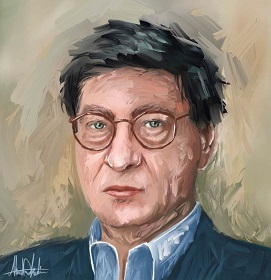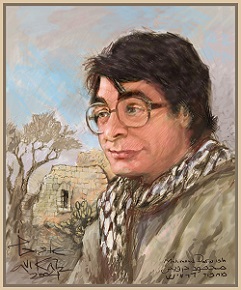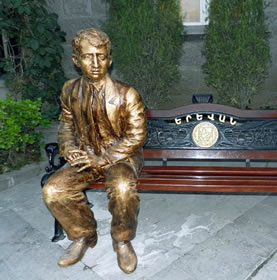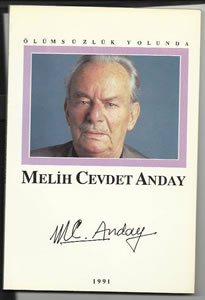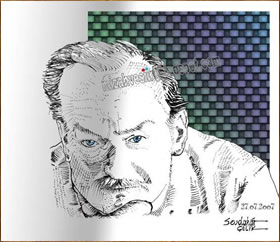De Palestijnse dichter Mahmoud Darwish werd geboren in Al-Birwa, Palestina, op 13 maart 1941. Hij was het tweede kind van Salim en Houreyyah Darwish. Zijn vader, moslim, was landeigenaar. Zijn moeder was analfabete, zijn grootvader leerde hem lezen. Tijdens de Arabisch-Israëlische Oorlog van 1948 werd hun dorp vernietigd en vluchtte de familie naar Libanon. Een jaar later keerden ze terug naar de omgeving van Akko, dat nu in Israël lag, en vestigden ze zich in Deir Al Asad. Darwish bezocht de middelbare school in Kafr Yasif. Daarna verhuisde hij naar Haifa. Hij publiceerde zijn eerste gedichtenbundel Asafir Bila Ajniha op negentienjarige leeftijd. In 1970 vertrok hij naar de Sovjet-Unie. Hij studeerde daar een jaar aan de Universiteit van Moskou, waarna hij naar Egypte en Libanon verhuisde. Toen Darwish in 1973 lid werd van de Palestijnse Bevrijdingsorganisatie PLO, werd hem de toegang tot Israël ontzegd. In 1995 kreeg hij toestemming om er de begrafenis bij te wonen van zijn vriend Emile Habibi. Daarna kreeg hij van de Israëlische overheid de toestemming om te blijven. Hij ging toen in Ramallah op de Westelijke Jordaanoever wonen. Darwish is tweemaal gehuwd en gescheiden. Zijn eerste echtgenote was de schrijfster Rana Kabbani. In 1985 trouwde hij met de Egyptische tolk Hayat Heeni. Darwish publiceerde meer dan dertig gedichtenbundels en acht prozawerken. Hij was uitgever van de bladen Al Jadid, Al Fajr, Shu’un Filistiniyya en Al Karmel (1981). Hij kreeg internationale erkenning voor zijn poëzie, waarin zijn affectie voor Palestina en zijn misprijzen voor de staat Israël centraal stond.In 2004 ontving Darwish de Prins Claus Prijs voor zijn oeuvre. Zijn werk werd in meer dan twintig talen vertaald.
Identity Card
Record !
I am an Arab
And my identity card is number fifty thousand
I have eight children
And the nineth is coming after a summer
Will you be angry?
Record !
I am an Arab
Employed with fellow workers at a quarry
I have eight children
I get them bread
Garments and books
from the rocks…
I do not supplicate charity at your doors
Nor do I belittle myself
at the footsteps of your chamber
So will you be angry?
Record !
I am an Arab
I have a name without a title
Patient in a country
Where people are enraged
My roots
Were entrenched before the birth of time
And before the opening of the eras
Before the pines, and the olive trees
And before the grass grew.
My father..
descends from the family of the plow
Not from a privileged class
And my grandfather..was a farmer
Neither well-bred, nor well-born!
Teaches me the pride of the sun
Before teaching me how to read
And my house
is like a watchman’s hut
Made of branches and cane
Are you satisfied with my status?
I have a name without a title !
Record !
I am an Arab
You have stolen the orchards
of my ancestors
And the land
which I cultivated
Along with my children
And you left nothing for us
Except for these rocks..
So will the State take them
As it has been said?!
Therefore !
Record on the top of the first page:
I do not hate people
Nor do I encroach
But if I become hungry
The usurper’s flesh will be my food
Beware..
Beware..
Of my hunger
And my anger !
Psalm 9
O rose beyond the reach of time and of the senses
O kiss enveloped in the scarves of all the winds
surprise me with one dream
that my madness will recoil from you
Recoiling from you
In order to approach you
I discovered time
Approaching you
in order to recoil form you
I discovered my senses
Between approach and recoil
there is a stone the size of a dream
It does not approach
It does not recoil
You are my country
A stone is not what I am
therefor I do not like to face the sky
not do I die level with the ground
but I am a stranger, always a stranger
Mahmoud Darwish (13 maart 1941 – 9 augustus 2008)
De Armeense dichter Yeghishe Charents werd geboren op 13 maart 1897 in Kars (toen Rusland, nu Turkije). In 1915 trok hij naar Moskou om zijn opleiding aan de universiteit verder te vervolgen. Hij werd getuige van de revolutie en werd door de ideologie ervan beïnvloed. In 1918 sloot hij zich aan bij het Rode Leger. In 1919 keerde hij terug naar Jerevan en werkte hij een tijd als leraar. Toen de communisten in 1922 Armenië bezetten ging hij opnieuw naar Moskou, maar keerde al snel weer terug om zich aan literatuur en cultuur te wijden. Hij publiceerde zes dichtbundels en een roman.
Uit: Poem For Everone (Fragment)
Part four
Yerevan.
That is to say – Nairi.
. . . . . . . . . . . . . . . . . . . .
Crossroads of continents
Where East and West meet
Stands ancient Nairi –
A blood-stained
Question mark
Erect
Like a dream
Driven deep into past –
Is that not Nairi? . . . . .
The days are flying
Days of fire –
Flying fast . . . .
Shall I grasp your soul
And hurl it like an iron disk –
Hurl it into the future . . . .
They are now
Re-building the world –
Re-building it
Street by street –
A Muscovite workman
By the name of Ivan,
A Chung-Fu,
A Hans,
A Boghos –
. . . . . . . . . . . . . . . . . . . .
EPILOGUE
Now –
Everywhere – Can you hear?
Bells ringing . . . .
Ringing with defiance!
I tell you the world has become
A street of universal joy
And a Chung-Fu from Peking
Drinks and shouts
To your health, Boghos!
And if my bright hopes
Were to turn to ashes
I shall continue to sing
Hosannas to you
Mighty iron-brother!
And if these days of f
ire
Were to end in disaster
I shall continue to sing –
Sing your glorious deeds
I – a feeble
Final voice . . . .
Vertaald door Ara Baliozian
Yeghishe Charents (13 maart 1897 – 29 november 1937)
Portret door Martiros Saryan
De Turkse dichter Melih Cevdet (eig. Melih Cevdet Anday) werd geboren op 13 maart 1915 in Istanboel.Zie ook alle tags voor Melih Cevdet op dit blog.
Deur
Ik loop langs de boom.
Hij staat waar hij hoort,
Maar als ik nu plotseling omkijk?
Ik loop over de koude stenen.
Mijn hele lichaam wordt warm,
Wat is dit voor hellevuur?
Ik neem de zon aan mijn zij,
Leg de zee voor mij open.
Boom, steen, zon, zee,
Stuk voor stuk arm en ellendig.
Ik ben een van jullie.
Ik sta waar ik hoor – als de boom,
Ben koud als de steen,
Warm als de zon,
Kalm als de zee.
Op een dag zei ik tegen mezelf-
‘Ik heb dus ook ogen
Net als handen en voeten.’
Dat bedacht ik met mijn verstand.
Eerst kregen mijn handen en voeten verstand
Toen kreeg mijn verstand handen en voeten.
Alle werkverdeling verdween.
Deze deur heb ik zelf ingetrapt,
Als een gek, als een wild beest.
Ineens stond ik oog in oog
Met dat gelukkige, trouwe, natuurlijke,
Dat eerlijke, heldere, oorspronkelijke,
Verloren heelal.
Vertaald door Erik Jan Zürcher
The Battle Of Kadesj
On one of the banks of River Orontes
Mutawallis stood among his soldiers
And stared without stirring.
On the opposite bank, the Pharaoh
Ramses had mounted his chariot:
He stared straight ahead.
This is all we know about it.
Even though history tells it at length
This look is all that remains or can remain.
Engelse vertaling door Talat Sait Halman
Melih Cevdet (13 maart 1915 – 28 november 2002)
De Duitse dichter Oskar Loerke werd geboren op 13 maart 1884 in Jungen. Zie ook alle tags voor Oskar Loerke op dit blog.
Der Silberdistelwald
Mein Haus, es steht nun mitten
im Silberdistelwald.
Pan ist vorbeigeschritten.
Was stritt, hat ausgestritten
in seiner Nachtgestalt.
Die bleichen Disteln starren
im Schwarz, ein wilder Putz.
Verborgne Wurzeln knarren:
Wenn wir Pans Schlaf verscharren,
nimmt niemand ihn in Schutz.
Vielleicht, daß eine Blüte
zu tiefer Kommunion
ihm nachfiel und verglühte:
mein Vater du, ich hüte,
ich hüte dich, mein Sohn.
Der Ort liegt waldinmitten,
von stillstem Licht gefleckt.
Mein Herz – nichts kam geritten,
kein Einhorn kam geschritten –
mein Herz nur schlug erweckt.

Oskar Loerke (13 maart 1884 – 24 februari 1941)
De Franse dichter, schrijver en diplomaat Paul Morand werd geboren op 13 maart 1888 in Parijs. Zie ook alle tags voor Paul Morand op dit blog.
Uit: Les gratte-ciel
“Les gratte-ciel ! Il y en a qui sont des femmes et d’autres des hommes ; les unssemblent des temples au Soleil, les autres rappellent la pyramide aztèque de laLune. Toute la folie de croissance qui aplatit sur les plaines de l’Ouest les villesaméricaines et fait bourgeonner à l’infini les banlieues vivipares s’exprime ici parune poussée verticale. Ces in-folios donnent à New-York sa grandeur, sa force, sonaspect de demain. Sans toits, couronnés de terrasses, ils semblent attendre desballons rigides, des hélicoptères, les hommes ailés de l’avenir. Ils s’affirmentverticalement, comme des nombres, et leurs fenêtres les suivent horizontalementcomme des zéros carrés, et les multiplient. Ancrés dans la chair vive du roc,descendant sous terre de quatre ou cinq étages, portant au plus profond d’eux-mêmes leurs organes essentiels, dynamos, chauffage central, rivetés au fer rouge,amarrés par des câbles souterrains, des poutrelles à grande hauteur d’âme, despylônes d’acier, il s’élèvent, tout vibrants du ballant formidable des étagessupérieurs ; la rage des tempêtes atlantiques en tord souvent le cadre d’acier, mais,par la flexibilité de leur armature, par leur maigreur ascétique, ils résistent. Lesmurs ont disparu, ne jouant plus aucun rôle de soutien ; ces briques creuses dont laconstruction est si rapide qu’on peut monter d’un étage par jour, ne sont qu’un abricontre le vent et ces granits, ces marbres qui garnissent la base des édifices n’ontque quelques millimètres d’épaisseur et ne constituent plus qu’un ornement ; lesplafonds en lattis sont simplement agrafés aux charpentes, le toit est fait de feuillesd’acier. »

Paul Morand (13 maart 1888 – 23 juli 1976)
De Oekraïense dichter en schrijver Yuri Andrukhovych werd geboren op 13 maart 1960 in Iwano-Frankiwsk. Zie ook alle tags voor Yuri Andrukhovych op dit blog.
Guess Who Was My Guest
From Songs For the Dead Rooster
Having hung on the door the triangular sign
with the words Do not disturb please
the hotel thief
locks himself in my room.
He is interested in money and valuables.
So am I, actually.
It turns out in this country they also
have thieves.
One of them at this very moment is perusing the drawers,
my photographs, address books
(why do I have two of them – why the hell
didn’t I file all the addresses together?),
delicately sifts through the contents of the suitcase,
delicately leaves in peace the most intimate things,
for example, a toy Chrysler car –
a silly gift from festival sponsors.
Later he grabs from the
bar a diet coke,
drinks it mechanically,
looks at Cyrillic letters in my books,
and concludes that I am Russian.
I can’t give you anything but love.
But here too I overshoot.
I can’t even give you love –
except for the brotherly one
which doesn’t count.
Such are the times.
At the last moment he does find
his four hundred plus bucks,
and doesn’t neglect the twenty hryvnias either,
probably taking them for some Algerian dinars,
as well as the return railway ticket
from Kyiv to Lviv.
A lot of use it will be for him in this Sweden of his,
where there’s no Kyiv, no Lviv,
where there’s nothing but a foreign land!
I’m already in the elevator
when he leaves for the hallway,
when he closes the door behind himself,
when he flips the triangular sign
to the now appropriate side saying
Please make up.
We meet by the elevator.
Sorry I was unable to give you love.
Buy some heroin for yourself for all the four hundred.
Vertaald door Vitaly Chernetsky
Yuri Andrukhovych (Iwano-Frankiwsk, 13 maart 1960)
De Canadese schrijver W.O. Mitchell werd geboren op 13 maart 1914 in Weyburn, Saskatchewan. Zie ook alle tags voor W. O. Mitchell op dit blog.
Uit: Who Has Seen the Wind
„Forbsie’s fat face shone. “Do we have to line up?” he said to Artie.
“Everybody does,” Artie answered, his face contorting at the offending glasses. “The girls go in the girls’ door an’ the boys go in the boys’ door. You better not let ‘em catch you going in the girls’ door.”
“Why not?” asked Brian.
“You’re not s’posed to. There’s two toilets. There’s the girls’ toilet on the girls’ side — an’ the boys’ on the boys’ side — in the basement.”
“Is there!” said Forbsie.
“That’s where old Tinhead is.” Artie referred to Mr. Briggs, the school janitor, said to have a silver plate in his head ever since he had served with the Princess Pats in the war.
Ahead of them and behind them small groups of children made their way to the school on the eastern edge of the town. “There’s the China Kids,” said Artie.
Brian saw them, the Wongs, Tang and Vooie. It was Vooie’s first day at school, and his sister, Tang, with the protectiveness of an older sister, had the collar of his coat clenched tight in her hand. Brian had seen the Wong children often, for they had grown up on that section of gray cement that ran before their father’s Bluebird Café. Now that the mother, a small amber woman brought from China by Wong to bear him Tang and Vooie, had died, the father had left Vooie to his sister’s care. He cooked meals for the children, and that was all. Brian knew Wong too, a small, stooped Chinese with a white mustache, who wore summer and winter a rooster-comb-toque. Brian had seen him often behind the café counter with its welter of cigarette and tobacco packets, its jaw breakers, licorice plugs, whips, pipes, and staring fried-egg candies.
Brian’s confidence ebbed as they neared the schoolyard on the prairie edge and as Artie regaled the other boys with stories of the terrible Miss MacDonald. She was cranky; she hated kids; it was she, he told Forbsie and Brian, who would be their teacher.“
W.O. Mitchell (13 maart 1914 – 25 februari 1998)
De Nederlands schrijfster Hermine de Graaf werd geboren in Winschoten op 13 maart 1951. Zie ook alle tags voor Hermine de Graaf op dit blog.
Uit: Een kaart, niet het gebied
“Het stadje waarin ze woonde was niet interessant voor kinderen, een groep huizen, straten erdoorheen die stervormig naar het middelpunt, een marktplein liepen. Op dat plein stonden parkeermeters bij rechthoekige vakken, er midden op verhief zich de kerk. Net een begraafplaats met grafzerken die hongerig riepen om kwartjes… dat was zo’n beetje alles wat er over het plaatje te vertellen viel”.
(…)
Als wij winkelruiten of spiegels voorbij liepen, volgde ik zijn ogen die het niet na konden laten er blikken in te werpen, waren de ruiten vuil of de spiegels verweerd dan zag ik ogen die boos spatten….’, ‘Spiegels kunnen mensen rechtstreeks met hun beeltenis confronteren, als er niets in de wereld zou zijn dat je beeltenis kon weerkaatsen, dan zou je op grond van andere tekens een beeld van jezelf moeten vormen, meer gebaseerd op je innerlijk en gericht op wat anderen over je zeiden. Het zou voor Simon beter geweest zijn…’
Hermine de Graaf (Winschoten, 13 maart 1951)
De Franse schrijver Didier Decoin werd geboren op 13 maart 1945 in Boulogne-Billancourt (Seine). Hij is de zoon van de cineast Henri Decoin. Decoin begon zijn loopbaan als journalist bij France Soir, Le Figaro en bij de radio. In 1977 ontving hij voor zijn roman John l’Enfer de Prix Goncourt. Decoin schrijft ook scenario’s voor film en televisie.
Uit: Avec vue sur la mer (2005)
„Durant la Première Guerre mondiale, mon père pilotait, dans la prestigieuse escadrille de Guynemer, une extravagante libellule de toile et de bois dont on lui avait juré qu’il s’agissait d’un avion de chasse. Et de fait, l’insecte volait Du moins quand il faisait beau et que les mitrailleurs ennemis ne s’acharnaient pas trop sur lui.
Un jour qu’il avait essuyé les feux conjugués d’une batterie antiaérienne et d’un biplan à croix noires embusqué sous l’ourlet d’un nuage rose, mon père, bien que blessé, avait tout de même réussi à ramener dans les lignes françaises son aéroplane transformé en passoire.
En s’extrayant de la carcasse, il avait recensé soixante-seize impacts. Avec l’éclat que lui-même avait reçu dans le dos, cela faisait soixante-dix-sept raisons de mourir. Et donc soixante-dix-sept miracles puisqu’il était toujours là pour les compter.
H en avait déduit que ce nombre était pour lui celui de la chance, et il me l’avait en quelque sorte légué, me prédisant que 1977 serait le millésime de ma vie.
Il ne s’était pas trompé puisque cette année-là j’épousai Chantai en septembre, mon roman John l’Enfer obtint le prix Goncourt en novembre et, en décembre, nous apprîmes que nous allions avoir notre premier enfant.“

Didier Decoin (Boulogne-Billancourt 13 maart 1945)
De Britse schrijver Hugh Seymour Walpole werd geboren op 13 maart 1884 in Auckland, Nieuw Zeeland. Zie ook alle tags voor Hugh Walpole op dit blog.
Uit: The Captives
„They must escape from that figure, now decent, clean, and solemn, lying upon the bed upstairs. Mathew took his niece by the hand and said:
“My dear, a little fresh air is the thing for both of us. It will cheer you up.”
So they went out for a walk together. Maggie knew, with a deep and intimate experience, every lane and road within twenty miles’ radius of St. Dreot’s, There was the high-road that went through Gator Hill to Clinton and then to Polwint; here were the paths across the fields to Lucent, the lanes that led to the valley of the Lisp, all the paths like spiders’ webs through Rothin Wood, from whose curve you could see Polchester, grey and white, with its red-brown roofs and the spires of the Cathedral thrusting like pointing fingers into the heaven. It was the Polchester View that she chose to-day, but as they started through the deep lanes down the St. Dreot’s hill she was startled and disturbed by the strange aspect which everything wore to her.“
Hugh Walpole (13 maart 1884 – 1 juni 1941)
De Duitse dichteres en schrijfster Inge Müller werd geboren op 13 maart 1925 in Berlijn. Na WO II werkte zij als secretaresse, journaliste, werkster, „Trümmerfrau“ en correspondente. Vanaf 1953 was zij zelfstandig schrijfster. Vaak werkte zij samen met haar man, de schrijver Heiner Müller aan toneelstukken en hoorspelen. Zij had ongetwijfeld zelf een groot talent, maar bleef toch lange tijd in de schaduw van haar man.
Uit: Daß ich nicht ersticke am Leisesein
“Du sollst zu deinem Großvater kommen”, sagte die Nachbarin, als ich auf ihr Klingeln öffnete.”Nein”, sagte ich und schob die Tür zu.”Sags deiner Mutter”, rief die Nachbarin.”Was ist?” fragte Mutter hinter meinem Rücken und schob die Tür wieder auf.”Ihr Schwiegervater ist unten auf der Straße. Die Kleine soll ihm helfen, sagt er. Er hat sein Fahrrad verloren.””Danke”, sagte meine Mutter und schlug die Tür zu. “Der versoffene Kerl. Es ist eine Schande.” Sie redete weiter, aber ich hörte es nicht mehr. Ich rannte die Treppe hinunter. Ich wußte jetzt, daß es nicht Großvater war, der auf mich wartete. Auf der kleinen Mauer vorm Haus saß Opa Meier.”Ich war gleich gekommen”, sagte ich, “aber sie sagte, es war Großvater. Sie weiß nicht Bescheid.”Opa Meier starrte auf einen Käfer, der auf den Steinen zu seinen Füßen herumkrabbelte. “Ich bin nicht dein Großvater, was?” Er hob den Käfer auf und setzte ihn auf die Hecke neben der Mauer.”Nein”, sagte ich. “Du bist mein Opa Meier.””Nach der Schrift bin ich dein Großvater. Dein Vater ist mein Sohn. Stimmt doch, was?” sagte Opa Meier und sah noch immer auf den Käfer. “Flieg”, sagte er und stieß ihn mit einem Finger an. “Wer fliegen kann, wird nicht zertreten.””Nein”, schrie ich. “Du bist nicht mein Großvater. Ich hab nur einen. Du bist mein Opa Meier.””Schrei nicht”, sagte er. “Du hast recht. Zum Teufel mit dem Großvater.”Ich war zufrieden. “Wo hast du dein Rad verloren?” fragte ich. Opa Meier sah mit einem schnellen Blick zur Haustür. “Ist sie oben?”Ich wußte, daß er meine Mutter meinte. Ich nickte und setzte mich zu ihm auf die Mauer. “Leise”, sagte er und zog mich näher zu sich heran. “Sonst holt sie dich weg.“

Inge Müller (13 maart 1926 – 1 juni 1966)
De Duitse dichter, schrijver en vertaler Richard Zoozmann werd geboren op 13 maart 1863 in Berlijn. Daar bezocht hij het gymnasium en werkte hij later bij een bank. Zoozmann is nog vooral bekend als verzamelaar en uitgever van citaten uit de wereldliteratuur.
Das Glück
Es huscht das Glück von Tür zu Tür,
Klopft zaghaft an: – wer öffnet mir?
Der Frohe lärmt im frohen Kreis
Und hört nicht, wie es klopft so leis.
Der Trübe seufzt: Ich laß nicht ein,
Nur neue Trübsal wird es sein.
Der Reiche wähnt, es pocht die Not,
Der Kranke bangt, es sei der Tod.
Schon will das Glück enteilen sacht;
Denn nirgends wird ihm aufgemacht.
Der Dümmste öffnet just die Tür –
Da lacht das Glück: “Ich bleib bei dir!
Richard Zoozmann (13 maart 1863 – 15 februari 1934)
De Duitse dichter, schrijver en criticus Oskar Blumenthal werd geboren op 13 maart 1852 in Berlijn. Als letterkundige werd hij bekend door zijn uitgave van het verzameld werk van Christian Dietrich Grabbe. Hij was een gevreesd criticus bij het Berliner Tageblatt van 1875 tot 1887. Zijn blijspel Im weißen Rößl diende als uitgangspunt voor de latere gelijknamige operette.
Bei Opern macht oft gleichen Kummer
Das Tonwerk wie das Textgedicht:
Die Dichtung reizt die Lust zum Schlummer,
Doch die Musik erlaubt ihn nicht.
***
Das ist ein häßliches Gebrechen,
wenn Menschen wie die Bücher sprechen.
Doch reich und fruchtbar sind für jeden
die Bücher, die wie Menschen reden!
Oscar Blumenthal (13 maart 1852 – 24 april 1917)
